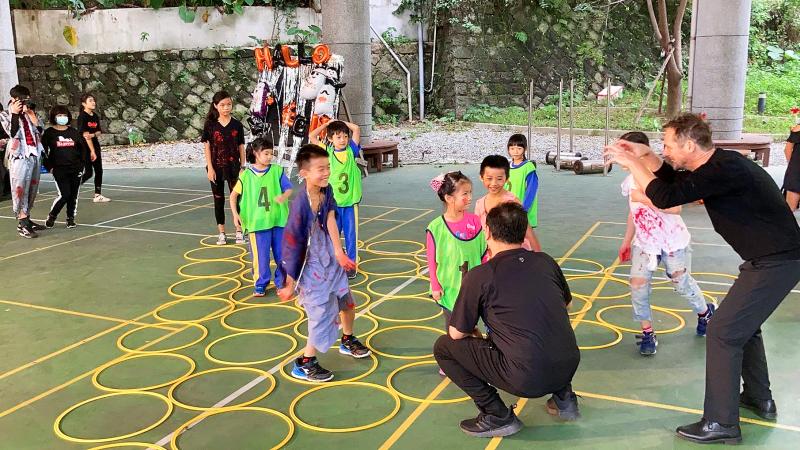The recruitment of foreign English teachers for elementary and junior-high schools would be expanded in the 2022-2023 school year as part of Taiwan’s efforts to become a bilingual country, the Ministry of Education (MOE) said yesterday.
In a statement, the ministry said that it has since 2004 hired 81 foreign nationals per year to teach English in 16 smaller counties and cities to build a better English-learning environment for students.
However, for the 2022-2023 school year, the number of foreign English teachers recruited would increase to 531, with some of them to be posted to Taipei, New Taipei City, Taoyuan, Taichung, Tainan and Kaohsiung, it said.

Photo: Yu Chao-fu, Taipei Times
The ministry did not say whether the recruitment surge would continue after the school year ended.
The ministry has commissioned universities to set up coordination centers — Taipei’s National Taiwan Normal University (NTNU) in the north and Kaohsiung’s National Sun Yat-sen University in the south — to help local governments maximize their English teaching resources.
The two coordination centers would also be responsible for working with universities across the nation to establish training programs for foreign English teachers and ensure they are doing a good job, the ministry said.
Those interested could apply online (tfetp.epa.ntnu.edu.tw), while the public could also recommend candidates, it said.
Candidates with the most potential would be interviewed, it said, adding that the recruitment drive would continue until the 531 posts were filled.
The policy to make Taiwan bilingual by 2030 was initiated by Vice President William Lai (賴清德) in 2018 when he was premier. In June of that year, Lai prioritized the “Bilingual Nation 2030” plan as a major national policy.
The National Development Council said that the government’s policy would help make young people more competitive in the global job market and help them connect with the world.

Beijing could eventually see a full amphibious invasion of Taiwan as the only "prudent" way to bring about unification, the US Department of Defense said in a newly released annual report to Congress. The Pentagon's "Annual Report to Congress: Military and Security Developments Involving the People's Republic of China 2025," was in many ways similar to last year’s report but reorganized the analysis of the options China has to take over Taiwan. Generally, according to the report, Chinese leaders view the People's Liberation Army's (PLA) capabilities for a Taiwan campaign as improving, but they remain uncertain about its readiness to successfully seize

HORROR STORIES: One victim recounted not realizing they had been stabbed and seeing people bleeding, while another recalled breaking down in tears after fleeing A man on Friday died after he tried to fight the knife-wielding suspect who went on a stabbing spree near two of Taipei’s busiest metro stations, Taipei Mayor Chiang Wan-an (蔣萬安) said. The 57-year-old man, identified by his family name, Yu (余), encountered the suspect at Exit M7 of Taipei Main Station and immediately tried to stop him, but was fatally wounded and later died, Chiang said, calling the incident “heartbreaking.” Yu’s family would receive at least NT$5 million (US$158,584) in compensation through the Taipei Rapid Transit Corp’s (TRTC) insurance coverage, he said after convening an emergency security response meeting yesterday morning. National

Taiwan has overtaken South Korea this year in per capita income for the first time in 23 years, IMF data showed. Per capita income is a nation’s GDP divided by the total population, used to compare average wealth levels across countries. Taiwan also beat Japan this year on per capita income, after surpassing it for the first time last year, US magazine Newsweek reported yesterday. Across Asia, Taiwan ranked fourth for per capita income at US$37,827 this year due to sustained economic growth, the report said. In the top three spots were Singapore, Macau and Hong Kong, it said. South

Taiwan is getting a day off on Christmas for the first time in 25 years. The change comes after opposition parties passed a law earlier this year to add or restore five public holidays, including Constitution Day, which falls on today, Dec. 25. The day marks the 1947 adoption of the constitution of the Republic of China, as the government in Taipei is formally known. Back then the Chinese Nationalist Party (KMT) governed China from Nanjing. When the KMT, now an opposition party in Taiwan, passed the legislation on holidays, it said that they would help “commemorate the history of national development.” That